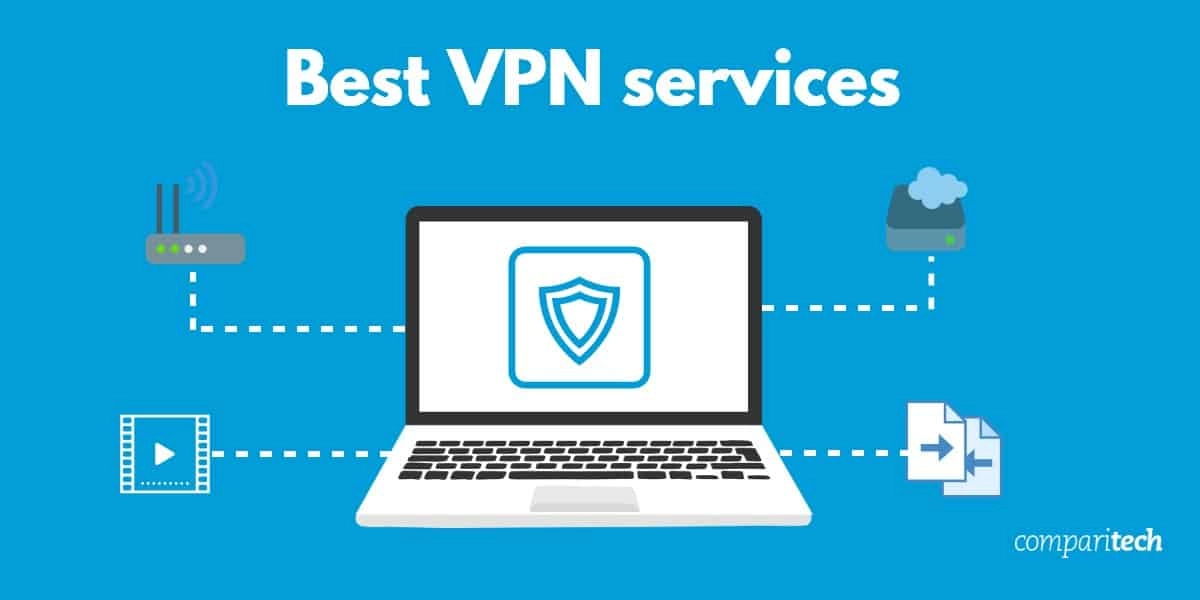Cloud Management Platforms: Features, Benefits, Best Practices And More
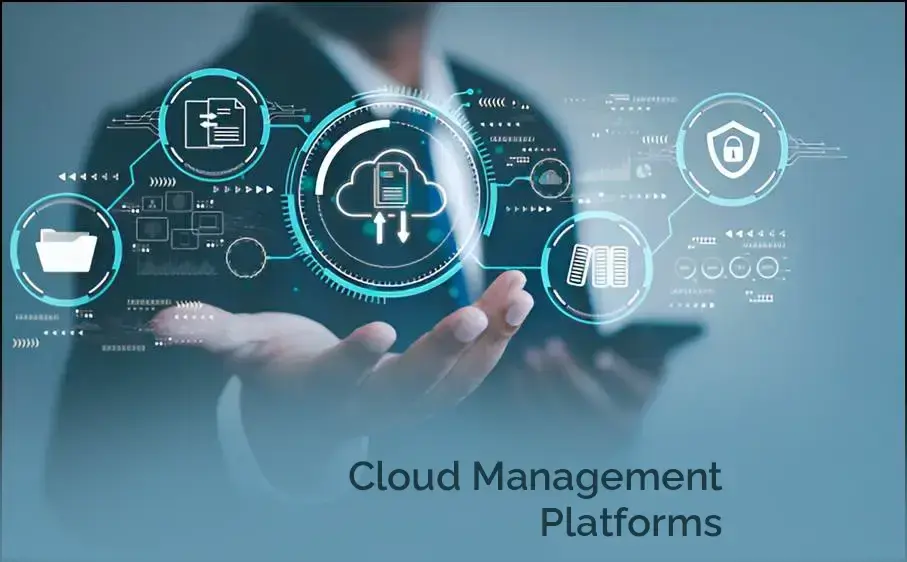
Cloud computing has transformed the way businesses operate, offering scalable resources, cost efficiency, and enhanced flexibility. However, managing multiple cloud environments efficiently can be challenging. This is where Cloud Management Platforms (CMPs) come into play. CMPs help organizations orchestrate, monitor, and automate their cloud resources to optimize costs, enhance security, and improve operational efficiency.
This article explores Cloud Management Platforms in-depth, covering their features, benefits, and best practices for effective implementation. Additionally, we will analyze the leading CMP solutions and discuss the challenges and future trends in cloud management.
Understanding Cloud Management Platform
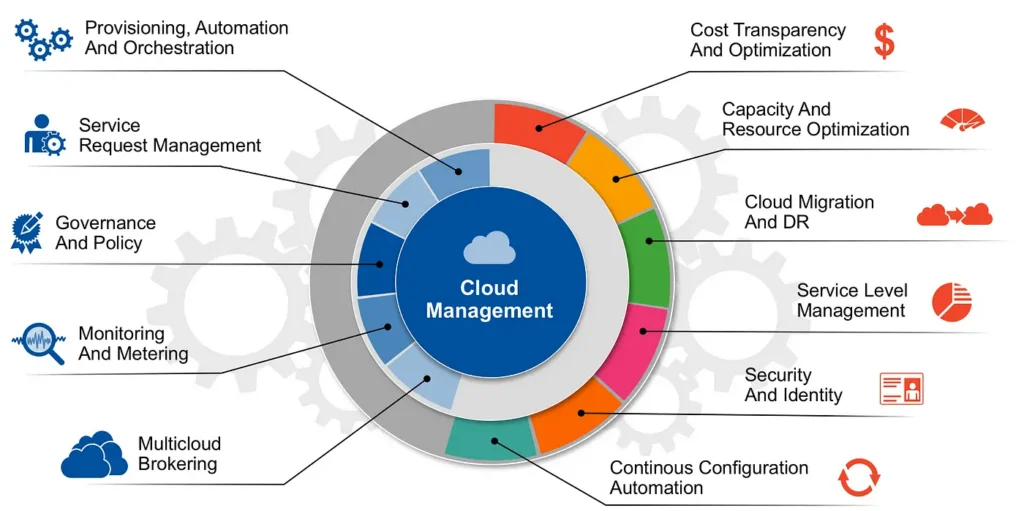
A Cloud Management Platform (CMP) is a comprehensive solution that enables businesses to monitor, control, and optimize their cloud computing resources across multiple environments. CMPs provide a centralized interface for managing cloud services, allowing organizations to automate workflows, track usage, ensure security compliance, and control costs efficiently. Key features of a CMP include resource provisioning, performance monitoring, cost analytics, and security enforcement, helping businesses streamline operations and improve efficiency. As cloud adoption continues to grow, CMPs have become essential for organizations looking to maximize performance, enhance security, and maintain cost-effective cloud usage.
Evolution of Cloud Management Platforms
- Early Challenges: As cloud adoption increased, businesses faced challenges in resource management, security compliance, and cost control across different providers.
- Emergence of CMPs: Companies began developing CMPs to unify cloud management and provide automated solutions for monitoring, provisioning, and optimization.
- Modern CMPs: Today’s CMPs integrate AI-driven analytics, automation, and security tools to simplify cloud operations.
- Used to manage cloud services from AWS, Google Cloud, Microsoft Azure, etc.
- Provides scalability, cost efficiency, and automation tools.
- Designed for on-premise cloud infrastructure.
- Helps organizations maintain control over sensitive data.
- Combines public and private cloud management.
- Provides greater flexibility and security.
- Manages cloud services across multiple providers.
- Ideal for enterprises leveraging diverse cloud solutions.
Key Features of Cloud Management Platforms
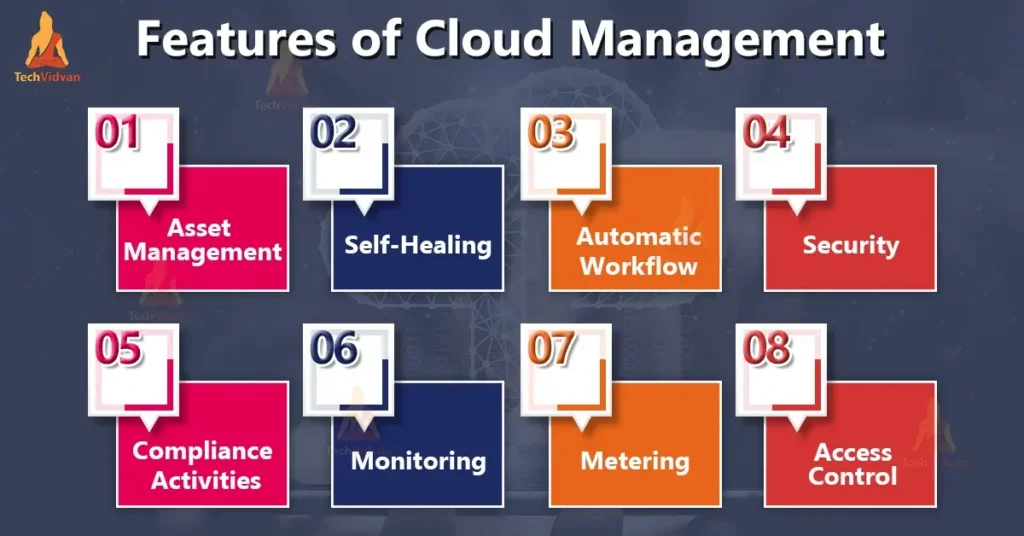
Cloud Management Platforms (CMPs) offer a range of key features that help organizations efficiently manage their cloud resources across multiple environments. One of the most essential features is automation and orchestration, which allows businesses to streamline workflows, automate provisioning, and optimize resource allocation. CMPs also support multi-cloud and hybrid cloud management, enabling businesses to manage services across various providers like AWS, Azure, and Google Cloud from a unified dashboard. These features make CMPs a vital tool for organizations seeking to enhance scalability, security, and cost efficiency in their cloud operations.
Cloud Service Provisioning
- Enables organizations to automate the deployment of cloud resources.
- Provides self-service portals for teams to manage workloads.
- Cost tracking and analytics to optimize cloud spending.
- Identifies underutilized resources to minimize costs.
- Implements budget alerts and cost forecasting tools.
- Ensures seamless management across multiple cloud providers.
- Prevents vendor lock-in by offering cross-platform compatibility.
- Role-Based Access Control (RBAC) for secure cloud access.
- Implements encryption and threat detection to prevent cyberattacks.
- Helps organizations maintain GDPR, HIPAA, and ISO compliance.
- Real-time dashboards for tracking cloud performance.
- AI-driven predictive analytics to optimize workloads.
Benefits of Using Cloud Management Platforms
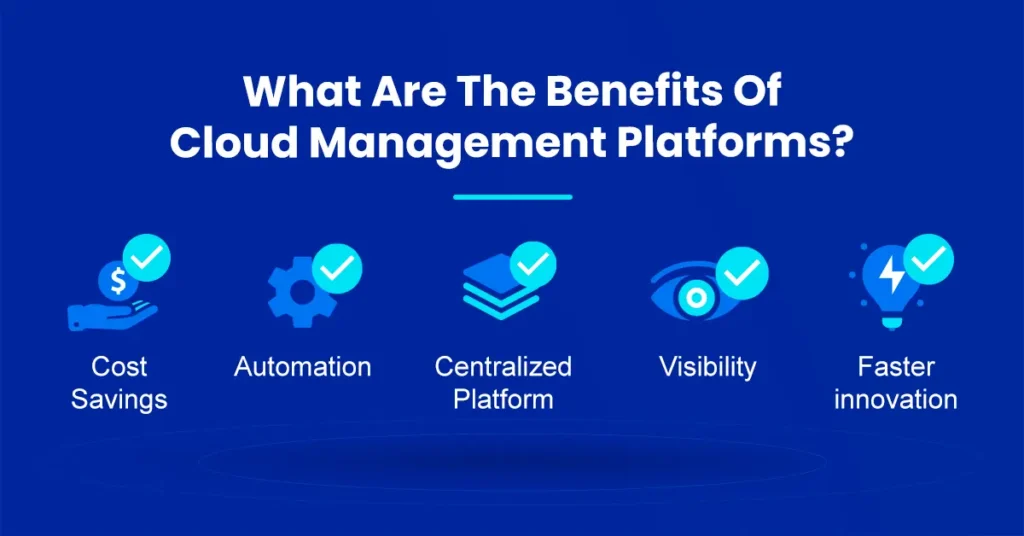
Using a Cloud Management Platform (CMP) offers numerous benefits, helping organizations streamline cloud operations, enhance security, and optimize costs. One major advantage is cost efficiency, as CMPs provide detailed insights into cloud spending, enabling businesses to eliminate wasted resources and optimize budgets. With real-time monitoring and analytics, organizations can proactively address performance issues, ensuring reliability and uptime. Overall, CMPs empower businesses to manage cloud environments more effectively, improving scalability, security, and cost control.
Cost Savings and Financial Efficiency
Cloud Management Platform (CMP) is its ability to drive cost savings and financial efficiency by optimizing cloud resource usage. CMPs provide real-time cost monitoring and analytics, allowing businesses to track spending, identify unnecessary expenses, and prevent budget overruns. They also enable automated scaling, ensuring that companies only pay for the resources they actually use, rather than over-provisioning. Cost allocation and forecasting tools help organizations distribute expenses effectively across departments and plan future cloud budgets with greater accuracy. cloud waste, improving cost visibility, and optimizing resource allocation, CMPs play a crucial role in enhancing an organization’s financial efficiency and maximizing return on investment (ROI).
Best Practices for Implementing Cloud Management Platforms
Implementing a Cloud Management Platform (CMP) effectively requires following best practices to maximize efficiency, security, and cost savings. First, organizations should define clear objectives for cloud management, such as cost optimization, security compliance, or multi-cloud integration, to align the CMP with business goals. Finally, regular performance reviews and updates should be conducted to adapt to evolving cloud needs and ensure the CMP remains efficient. Following these best practices helps organizations fully utilize their CMP, improving scalability, security, and financial efficiency in cloud operations.
Top Cloud Management Platforms in 2025
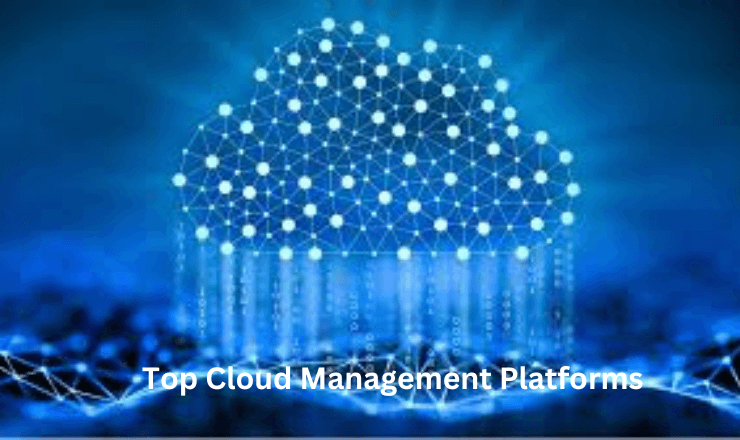
In 2025, the landscape of Cloud Management Platforms (CMPs) has evolved to meet the complex demands of modern enterprises, emphasizing automation, cost optimization, and multi-cloud integration. Leading CMPs include:
nOps: Recognized for its robust AWS cost optimization capabilities, nOps offers features like automated resource management and real-time cost analysis, enabling businesses to reduce expenses by up to 60%.
IBM Cloud Orchestrator: This platform provides end-to-end service deployment across infrastructure and platform layers, facilitating quick and secure monitoring, management, and backup of cloud environments.
Apache CloudStack: An open-source solution, Apache CloudStack delivers a comprehensive set of features for managing virtualized environments, including compute orchestration, Network-as-a-Service, and user account management.
Apptio Cloudability: Focused on cloud financial management, Apptio Cloudability enhances visibility and governance across cloud environments, assisting organizations in optimizing their cloud resources for cost, speed, and performance.
Morpheus Data: Initially designed for DevOps practitioners, Morpheus Data offers features for building application infrastructure, governing hybrid clouds, automating cloud management workflows, and optimizing cloud costs.
These platforms exemplify the industry’s shift towards more integrated and intelligent cloud management solutions, catering to the diverse needs of businesses navigating the complexities of cloud computing in 2025.
Challenges and Future Trends in CMPs
Cloud Management Platforms (CMPs) continue to evolve, but they face several challenges as cloud adoption grows more complex. Security and compliance are also critical concerns, with organizations needing robust solutions to prevent cyber threats, ensure data protection, and meet regulatory requirements. Cost management complexities persist, as cloud spending fluctuates based on usage, making real-time tracking and optimization essential. Looking ahead, future trends in CMPs include the rise of AI-driven automation, which will enhance predictive analytics, workload optimization, and security monitoring. Edge computing integration will also become more prominent, enabling organizations to manage distributed resources efficiently.
Frequently Asked Question
Why do businesses need a Cloud Management Platform?
Businesses use CMPs to streamline cloud operations, improve cost efficiency, ensure compliance, and enhance security. CMPs provide centralized control, automation, and visibility over cloud resources, reducing complexity and enabling better decision-making.
How does a Cloud Management Platform help with cost optimization?
CMPs analyze cloud usage patterns and recommend cost-saving strategies, such as rightsizing instances, identifying unused resources, and offering automated scaling options. Many platforms also provide budget tracking and forecasting tools to prevent overspending.
Can a CMP manage multi-cloud and hybrid cloud environments?
Yes, most modern CMPs support multi-cloud (managing resources across different cloud providers like AWS, Azure, and Google Cloud) and hybrid cloud (integrating on-premises infrastructure with cloud services). This flexibility allows businesses to optimize performance and avoid vendor lock-in.
What are the key features to look for in a Cloud Management Platform?
An effective CMP should offer automation, security management, compliance tracking, performance monitoring, cost analysis, and multi-cloud support. Integration with existing IT tools and ease of use are also crucial factors when selecting a platform.
Conclusion
Cloud Management Platforms play a critical role in modern IT environments, enabling organizations to manage costs, security, automation, and multi-cloud deployments efficiently. By implementing best practices, businesses can maximize the benefits of cloud computing while overcoming its challenges. With continuous advancements in AI, security, and automation, CMPs will continue to evolve, making cloud management more streamlined and effective.




